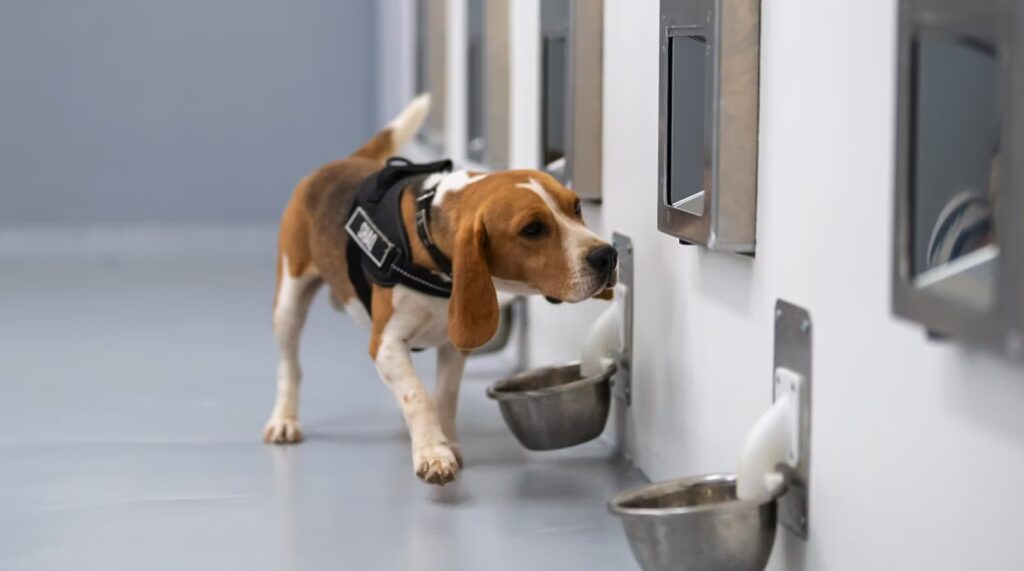
Israeli startup SpotitEarly launched in the U.S. on Thursday, aiming to close a significant gap in the cancer diagnostics market. The company is developing a breath-based early detection test for multiple types of cancer — one that involves dogs and their powerful noses.
The test uses AI and trained canines to analyze patients’ breath samples, with the goal of detecting cancer at its earliest stages.
“By making early cancer screening more accessible, we aim to improve early diagnosis rates and, consequently, increase the chances of survival,” said SpotitEarly CEO Shlomi Madar.

The Power of One: Redefining Healthcare with an AI-Driven Unified Platform
In a landscape where complexity has long been the norm, the power of one lies not just in unification, but in intelligence and automation.
The startup’s test requires patients to breathe into what looks like an N95 mask for three minutes. After the sample is collected, SpotitEarly’s canines use their snouts to sniff and detect cancer odor signatures found in a patient’s volatile organic compounds, which Madar described as “biological information from the blood in our lungs that travels into the air we exhale.”
If a dog identifies cancer signatures in a sample, it will signal this to the lab by sitting next to it, he stated.
As the dogs sniff samples in the lab, the company uses its AI platform to track and analyze their physiological and behavioral signals, collecting thousands of data points per second, Madar added.
SpotitEarly, founded in 2020, has already completed a two-year study for its test in Israel. The 1,400-participant study found that the test achieved a 94% accuracy rate.
The company is working with the Israeli Ministry of Health toward regulatory approval and future market entry, Madar said.
By launching in the U.S., SpotitEarly is opening the door for U.S. investors to participate in its Series A round, which is currently open. The startup’s seed funding totaled $20.3 million.
Madar pointed out that SpotitEarly is also currently running a clinical study in the U.S. that focuses on breast cancer detection. For this study, the startup is targeting participants who were already coming in for routine screenings.
Because the test is user-friendly and non-invasive, SpotitEarly has seen high acceptance rates among the participants in this trial, Madar noted.
The company plans to begin sending its cancer tests directly to consumers via a physician network in 2026, he said — adding that it will “continue to forge partnerships with health systems and research centers to improve the product’s accessibility.”
Users will start the process by ordering the test straight to their door via a physician. Then, they will collect their breath sample, package it up, and ship it off to a SpotitEarly lab, Madar explained.
In his eyes, SpotitEarly’s target customer is a person who wants to proactively manage their health.
“Unfortunately, traditional screening methods like mammograms and colonoscopies aren’t typically covered by insurance until around the age of 45, but cancer rates are climbing in younger populations, underserving critical populations. There is growing momentum to shift to a preventative healthcare model, but too often, the system still tends to prioritize reactive care over early detection,” Madar remarked.
While other direct-to-consumer cancer screening methods — such as fecal tests and whole-body MRI scans — are on the market, they are uncomfortable and out of financial reach for many, he added.
Take Prenuvo’s MRI as an example, Madar said.
“This scan costs patients around $2,500, and most Americans can’t cover a $1,000 emergency expense, so there is a clear disconnect between trying to catch cancer and other diseases early and the accessibility of this product,” he declared.
Grail, which sells the Galleri blood test, is another competitor. The Galleri test costs nearly $1,000, but it “performs poorly in detecting cancer at its earliest stages,” Madar stated.
He believes SpotitEarly stands out by offering a solution that is more comfortable and affordable than the others on the market. The test will cost $250 for a single type of cancer and $500 for all four types SpotitEarly screens for: breast, colorectal, prostate and lung.
“SpotitEarly differentiates itself by offering a non-invasive, comfortable and accessible alternative that you can do from anywhere, no matter how close you are to a hospital or medical center — and you aren’t boxing up your feces and other bodily fluids,” Madar remarked.
Overall, he said that establishing a presence in the U.S. will help the startup further its mission of reducing late-stage cancer diagnoses and create new opportunities for partnerships with leading research institutions.
Photo: SpotitEarly








